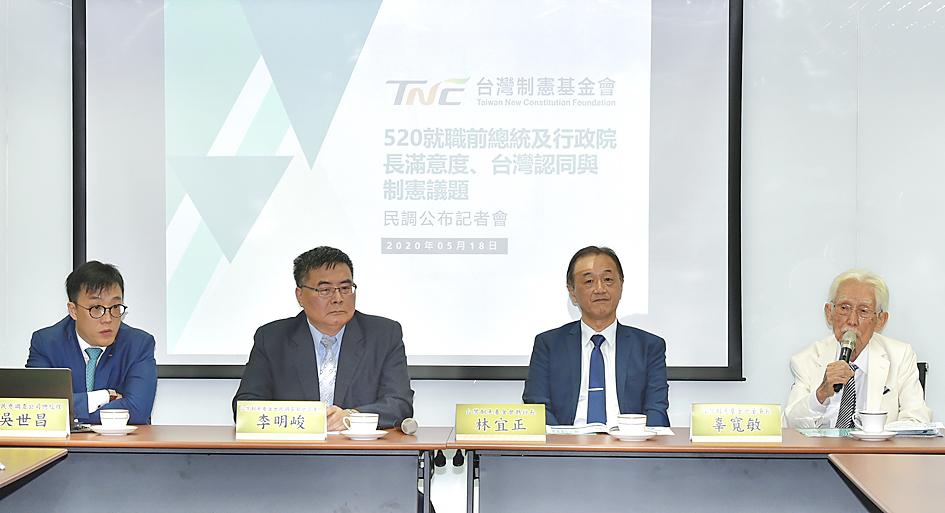A survey commissioned by activist group Taiwan New Constitution found that a majority of Taiwanese are unaware that the Constitution calls for eventual unification with China, and an overwhelming majority think a new constitution should be drafted, the group said yesterday.
The poll found that 73.6 percent of respondents felt that international confusion over Taiwan’s relationship with China had become a “serious problem,” the group said.
Asked whether they were aware that the Constitution called for eventual unification with China, 60.5 percent said no, while 38.2 percent said yes.

Photo: Tu Chien-jung, Taipei Times
Asked if the Constitution should be amended to decouple it from the “one China” framework, 67.6 percent said it should, while 17.8 percent said it should not.
Asked if a new constitution should be drafted, 80.3 percent said “yes,” and 11 percent said “no.”
The group said it felt that constitutional amendment or replacement was a necessary precursor to solving other problems faced by the government, such the nation’s flag carrier, telecommunications company and other organizations that use “China” in their names.
The group said the survey reflected a growing “Taiwanese consciousness,” with 70.3 percent of participants identifying as “Taiwanese,” 2.7 percent identifying as “Chinese” and 25.2 percent identifying as “both ‘Chinese’ and ‘Taiwanese.’”
Asked how they would identify if “Chinese” and “Taiwanese” were seen as mutually exclusive, 87.9 percent said they would call themselves “Taiwanese,” while only 6.9 percent would call themselves “Chinese,” it said.
Among those who identified as “Taiwanese,” 100 percent of those aged 18 or 19 did so, and 96.7 percent of those aged between 20 and 29 did, the group said.
As for cross-strait relations, 39.6 percent said they hoped for independence, 50 percent said they wanted relations to stay as they are, and 5.4 percent said they supported unification with China.
Compared with a survey done in August last year, that represented an 8.1 percent increase in those wishing for independence, and a 6.1 percent decrease in the number hoping for relations to stay the same, the group said.
If the “status quo” could not be maintained, 76.2 percent said Taiwan should formally declare independence, while 10.9 percent said it should unify with China.
Asked whether there were seperate nations on either side of the Taiwan Strait, 80.1 percent said “yes,” while 15.2 percent said “no.”
The nationwide survey, conducted by Trend Survey & Research Co (趨勢民意調查股份有限公司) on May 11 and 12, collected 1,121 valid samples and has a margin of error of 2.93 percentage points.

Right-wing political scientist Laura Fernandez on Sunday won Costa Rica’s presidential election by a landslide, after promising to crack down on rising violence linked to the cocaine trade. Fernandez’s nearest rival, economist Alvaro Ramos, conceded defeat as results showed the ruling party far exceeding the threshold of 40 percent needed to avoid a runoff. With 94 percent of polling stations counted, the political heir of outgoing Costa Rican President Rodrigo Chaves had captured 48.3 percent of the vote compared with Ramos’ 33.4 percent, the Supreme Electoral Tribunal said. As soon as the first results were announced, members of Fernandez’s Sovereign People’s Party

MORE RESPONSIBILITY: Draftees would be expected to fight alongside professional soldiers, likely requiring the transformation of some training brigades into combat units The armed forces are to start incorporating new conscripts into combined arms brigades this year to enhance combat readiness, the Executive Yuan’s latest policy report said. The new policy would affect Taiwanese men entering the military for their compulsory service, which was extended to one year under reforms by then-president Tsai Ing-wen (蔡英文) in 2022. The conscripts would be trained to operate machine guns, uncrewed aerial vehicles, anti-tank guided missile launchers and Stinger air defense systems, the report said, adding that the basic training would be lengthened to eight weeks. After basic training, conscripts would be sorted into infantry battalions that would take

GROWING AMBITIONS: The scale and tempo of the operations show that the Strait has become the core theater for China to expand its security interests, the report said Chinese military aircraft incursions around Taiwan have surged nearly 15-fold over the past five years, according to a report released yesterday by the Democratic Progressive Party’s (DPP) Department of China Affairs. Sorties in the Taiwan Strait were previously irregular, totaling 380 in 2020, but have since evolved into routine operations, the report showed. “This demonstrates that the Taiwan Strait has become both the starting point and testing ground for Beijing’s expansionist ambitions,” it said. Driven by military expansionism, China is systematically pursuing actions aimed at altering the regional “status quo,” the department said, adding that Taiwan represents the most critical link in China’s

‘REALLY PROUD’: Nvidia would not be possible without Taiwan, Huang said, adding that TSMC would be increasing its capacity by 100 percent Nvidia Corp CEO Jensen Huang (黃仁勳) on Saturday praised and lightly cajoled his major Taiwanese suppliers to produce more to help power strong demand for artificial intelligence (AI), capping a visit to the country of his birth, where he has been mobbed by adoring fans at every step. Speaking at an impromptu press conference in the rain outside a Taipei restaurant, where he had hosted suppliers for a “trillion-dollar dinner,” named after the market capitalization of those firms attending, Huang said this would be another good year for business. “TSMC needs to work very hard this year because I need a lot